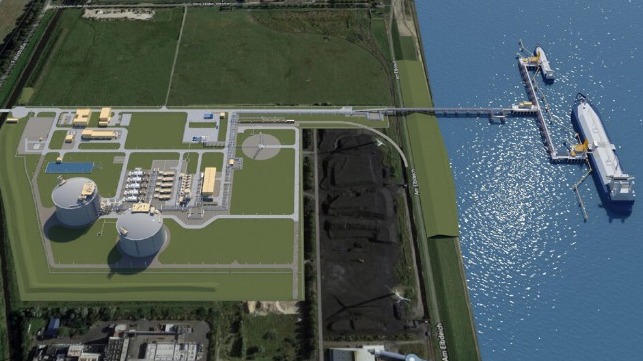Germany's Cabinet Moves to Head Off Lawsuits Against LNG Terminals

Germany's cabinet has introduced a legislative proposal that would allow regulators to speed up environmental impact assessments for LNG terminals, reflecting the government's urgent need to find alternatives to Russian gas. If passed, the bill would shorten the period for public participation in the process to two weeks, allowing the construction of gas pipelines and infrastructure for new LNG terminals to begin by this summer.
Germany has plans to commission one shoreside LNG terminal and four FSRUs, with the first floating unit coming online as early as this fall. At present, the nation has no LNG import facilities of its own, as it has long relied on Russian pipelines for the majority of its gas supply. When Russia invaded Ukraine in February, this decades-long trading relationship was disrupted, and German vice-chancellor Robert Habeck went on a whirlwind tour of gas-exporting nations in search of alternative supplies.
However, the government's plans to replace Russian pipeline gas with foreign LNG could be delayed by Germany's environmental activists. Environmental Action Germany ( Deutsche Umwelthilfe, or DUH) has already filed suit to halt a planned LNG import terminal in Wilhelmshaven, arguing that it "threatens massive damage to our climate and the sensitive North Sea habitat."
The group is also opposed to the cabinet's draft LNG acceleration bill, which would allow imports at up to 11 LNG terminals through 2043 - just two years short of Germany's climate-neutrality target date of 2045. The legislative proposal calls for converting the new gas infrastructure over to the use of green hydrogen in time to meet the deadline.
"The project list with eleven terminals [in the bill] stems from the economic profit interests of the German gas industry and has nothing to do with a reasonable coverage of German energy requirements. Here the war in Ukraine is used as a pretext to create facts in concrete and steel on the German coast that harm us and all generations to come," argued Sascha Müller-Kraenner, the federal managing director of DUH.

that matters most
Get the latest maritime news delivered to your inbox daily.
Habeck - a member of Germany's Green Party - has warned environmental groups not to file lawsuits to halt the construction of LNG import projects, cautioning that it would increase Germany's dependence on Russian energy. "You should not do that at this point," Habeck told German outlet RTL. "If we don't have the LNG terminals, and if the gas doesn't come from Russia, supply security in Germany is not guaranteed."
The vice-chancellor's hope is to fill all available storage over the summer, achieve gas consumption savings of 10 percent, and bring two FLNG terminals online by the time next winter comes, giving Germany enough capacity to weather a Russian gas shutdown through the next heating season. Russia has already terminated its natural gas sales to Poland and Bulgaria, citing their refusal to buy rubles for payment arrangements.
